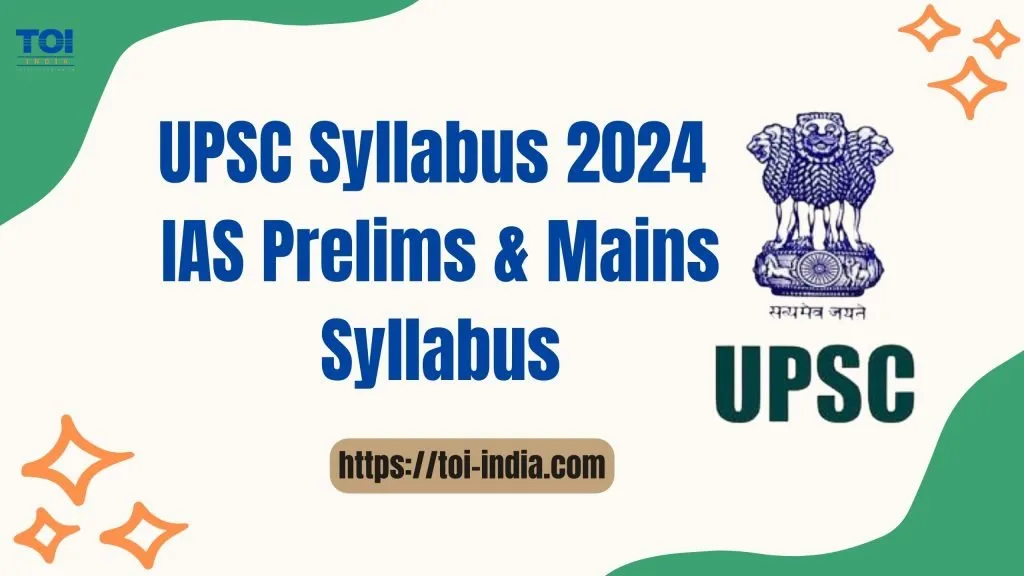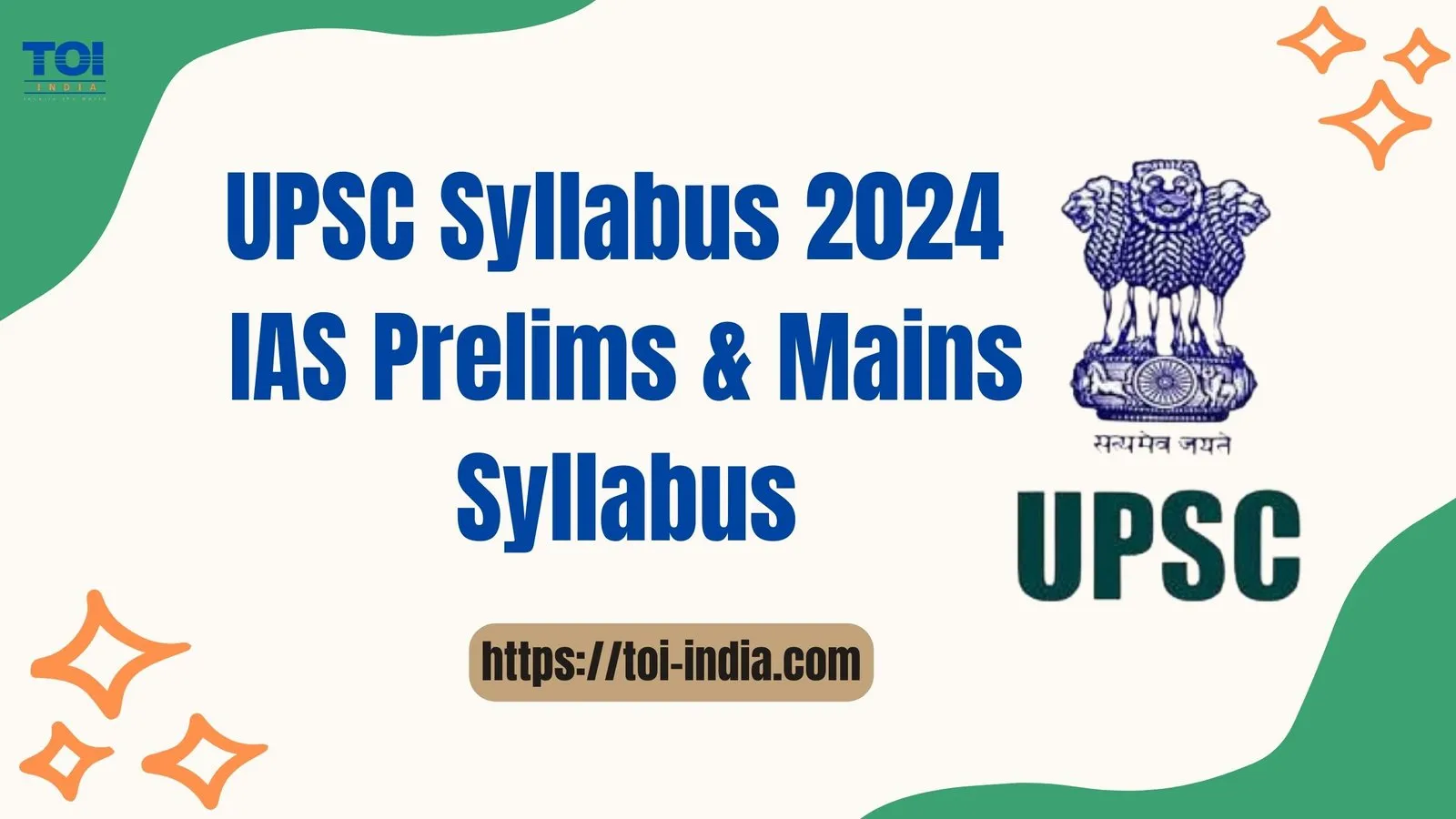A detailed explanation of the syllabus for both General Studies Paper-I and General Studies Paper-II, along with references to textbooks and publications that you can consider for preparation.
General Studies Paper-I:
- Current events of national and international importance: Stay updated with current affairs by reading newspapers like “The Hindu,” “The Indian Express,” and “Times of India.” Magazines like “Yojana” and “Kurukshetra” can also be helpful.
- History of India and Indian National Movement:
- “India’s Struggle for Independence” by Bipan Chandra
- “History of Medieval India” by Satish Chandra
- “Ancient India” by R.S. Sharma
- Indian and World Geography:
- “Certificate Physical and Human Geography” by Goh Cheng Leong
- “Oxford School Atlas” by Oxford University Press
- NCERT textbooks for Geography from classes 6 to 12
- Indian Polity and Governance:
- “Indian Polity” by M. Laxmikanth
- “Introduction to the Constitution of India” by D.D. Basu
- Economic and Social Development:
- “Indian Economy” by Ramesh Singh
- “Economic Survey” by the Government of India
- “Social Problems in India” by Ram Ahuja
- General issues on Environmental Ecology, Bio-diversity, and Climate Change:
- “Environment” by Shankar IAS
- “Ecology and Environment” by P.D. Sharma
- Reports by organizations like the IPCC and UNEP
- General Science:
- NCERT textbooks for Science from classes 6 to 10
- “Science and Technology” by Spectrum Publications
General Studies Paper-II (CSAT):
- Comprehension skills: Practice comprehension passages from previous year papers. Also, read newspapers and magazines to improve reading comprehension.
- Interpersonal skills including communication skills: Focus on improving your communication skills through regular reading, writing, and speaking practice.
- Logical reasoning and analytical ability:
- “A Modern Approach to Verbal & Non-Verbal Reasoning” by R.S. Aggarwal
- “Analytical Reasoning” by M.K. Pandey
- Decision making and problem-solving: Enhance your decision-making skills by solving case-based problems and practicing mock tests.
- General mental ability:
- “Logical and Analytical Reasoning” by A.K. Gupta
- Practice questions from various aptitude books and online resources.
- Basic numeracy and Data interpretation:
- “Quantitative Aptitude for Competitive Examinations” by R.S. Aggarwal
- “How to Prepare for Data Interpretation for the CAT” by Arun Sharma
Remember that it’s essential to not only rely on one particular book but to refer to multiple sources to get a comprehensive understanding of the topics. NCERT textbooks, standard reference books, and previous year question papers are your best companions for preparation. Always refer to the official UPSC website for any updates or changes to the syllabus and exam pattern.

UPSC Civil Services Main Examination Syllabus
The UPSC Civil Services Main Examination is an extensive assessment that consists of nine papers, which are divided into two categories: Qualifying Papers and Papers counted for Ranking. Here’s a detailed breakdown of the syllabus along with recommended books, magazines, and newspapers for each section:
Qualifying Papers:
- Paper-A (Indian Language): This paper tests your proficiency in an Indian language of your choice. It is of qualifying nature and requires you to write essays and answer questions in that language. Choose a language you are comfortable with.
- Paper-B (English): Similar to Paper-A, this paper tests your English language proficiency. It is also of qualifying nature and you’ll need to write essays and answer questions in English.
Papers Counted for Ranking:
- Essay Paper: This paper assesses your ability to express your thoughts coherently and present your opinions effectively on a given topic.
- No specific book is recommended, but reading extensively on various topics will improve your essay writing skills.
- Regularly read opinion pieces from newspapers like “The Hindu,” “The Indian Express,” and “Livemint.”
- General Studies Paper-I: This paper covers Indian Heritage and Culture, History, and Geography of the World and Society.
- Books:
- “History of Modern India” by Bipan Chandra
- “India’s Ancient Past” by R.S. Sharma
- Magazines: “Yojana,” “Kurukshetra”
- Newspapers: Focus on cultural, historical, and geographical articles in standard newspapers.
- General Studies Paper-II: This paper includes Governance, Constitution, Polity, Social Justice, and International Relations.
- Books:
- “Indian Polity” by M. Laxmikanth
- “Introduction to the Constitution of India” by D.D. Basu
- Magazines: “Frontline,” “World Focus”
- General Studies Paper-III: This paper covers Technology, Economic Development, Bio-diversity, Environment, Security, and Disaster Management.
- Books:
- “Indian Economy” by Ramesh Singh
- “Environment” by Shankar IAS
- Magazines: “Down to Earth”
- General Studies Paper-IV: This paper focuses on Ethics, Integrity, and Aptitude.
- Books:
- “Lexicon for Ethics, Integrity, and Aptitude” by Chronicle Publications
- Magazines: “Competition Wizard”
- Optional Paper-I and II: These papers are based on the subject you choose as your optional subject. It’s crucial to pick a subject you’re comfortable with and which is scoring.
- Refer to standard textbooks recommended for your chosen optional subject.
Note: Apart from these, it’s crucial to stay updated with current affairs by reading newspapers like “The Hindu,” “The Indian Express,” and “Livemint.” Additionally, magazines like “Yojana,” “Kurukshetra,” “Frontline,” and “World Focus” are beneficial for in-depth understanding.
Remember, the key to success in UPSC exams is not just memorization but also a deep understanding of the subjects. It’s essential to read, comprehend, and analyze various topics extensively. Also, make use of previous year question papers to practice and understand the exam pattern better.
UPSC Selection Process
The UPSC (Union Public Service Commission) Civil Services Examination is a rigorous and competitive process that consists of several stages to select candidates for various prestigious government services like the Indian Administrative Service (IAS), Indian Police Service (IPS), Indian Foreign Service (IFS), and more. The selection process involves the following stages:
- Preliminary Examination (Prelims): This is the first stage of the selection process. It consists of two objective-type papers – General Studies Paper-I and General Studies Paper-II (CSAT). The marks obtained in GS Paper-II are only for qualifying for the Main Examination.
- Main Examination (Mains): Candidates who clear the Prelims move on to the Main Examination. The Main Examination consists of nine papers, out of which two are qualifying papers (one Indian language and one English) and the remaining seven are counted for ranking. These seven papers include essay writing and a range of subjects related to General Studies and an optional subject chosen by the candidate.
- Personal Interview (Personality Test): Candidates who perform well in the Main Examination are shortlisted for the final stage – the Personality Test or Interview. This interview assesses the candidate’s personality, communication skills, knowledge, and suitability for a career in the civil services.
Elimination Chances:
The UPSC Civil Services Examination is known for its high level of competition. The elimination chances vary at each stage:
- Preliminary Examination: The Prelims have a relatively higher elimination rate as the objective-type questions and the negative marking scheme make it challenging. Generally, around 10 to 15 times the number of vacancies candidates are selected to appear for the Main Examination.
- Main Examination: The elimination rate between the Mains and the Interview is comparatively lower. Generally, around 2 to 2.5 times the number of vacancies candidates are shortlisted for the Personality Test.
- Personality Test (Interview): The elimination rate at this stage is relatively lower as candidates who have made it to the Interview have already cleared the Prelims and Mains. The final selection is made based on the candidate’s performance in the interview and their cumulative score in the Mains and Interview.
It’s important to note that while the competition is tough and many candidates are eliminated at various stages, the selection process is designed to identify the most suitable candidates for administrative positions in the government. To increase your chances of success, it’s crucial to have a well-rounded preparation strategy that includes not only thorough knowledge of the subjects but also good communication skills, effective time management, and the ability to adapt to changing situations. Additionally, consistent practice, revision, and staying updated with current affairs are key factors in performing well in the UPSC exams.
Here’s a general overview of the mark distribution:
Preliminary Examination (Prelims):
- General Studies Paper-I: 200 marks
- General Studies Paper-II (CSAT): 200 marks (only qualifying)
Main Examination (Mains): The Main Examination consists of seven papers, and each paper is of 250 marks, making the total marks for the Mains stage 1750.
Personal Interview (Personality Test): The Personal Interview or Personality Test carries 275 marks.
The final merit list is prepared based on the cumulative marks obtained in the Main Examination and the Interview. The marks obtained in the Preliminary Examination (GS Paper-I) are used to shortlist candidates for the Mains and are not counted in the final merit.
It’s important to note that the marking scheme can vary for different papers, and there might be changes introduced by the UPSC over time. Always refer to the official UPSC notifications and documents for the most accurate and updated information about the mark distribution and selection process.
UPSC Beginners where to start
Starting your journey with UPSC (Union Public Service Commission) as a beginner can be both exciting and challenging. Here’s a step-by-step guide to help you get started:
- Understand the Exam Structure: Familiarize yourself with the UPSC exam structure. The UPSC Civil Services Examination consists of three stages: Preliminary Examination (Objective), Main Examination (Descriptive), and Personality Test (Interview).
- Choose Your Optional Subject: The Main Examination includes an optional subject. Choose a subject you have a strong interest in and are comfortable with. Common choices include history, geography, sociology, public administration, and more.
- Study the Syllabus: Thoroughly go through the UPSC syllabus for both the Preliminary and Main Examinations. This will give you a clear idea of what topics you need to cover.
- Read Newspapers Regularly: Stay updated with current affairs by reading newspapers like The Hindu, Indian Express, etc. This will help you in both the Prelims and Mains.
- Basic Books for Prelims: Start with basic books that cover the core subjects like Indian Polity, Indian Economy, Modern Indian History, Geography, and General Science. For example, “Indian Polity” by M. Laxmikanth is a recommended book.
- NCERTs: Read NCERT (National Council of Educational Research and Training) books from class 6 to 12 for subjects like history, geography, science, and economics. These books provide a solid foundation.
- Prelims Preparation: Focus on both static and current affairs for the Prelims. Solve previous years’ question papers and take mock tests regularly to get a sense of the exam pattern and time management.
- Main Examination Preparation: For the Main exam, work on developing your writing skills. Practice answer writing and work on expressing your thoughts clearly and concisely. Refer to previous years’ question papers to understand the demand of the questions.
- Reference Books for Mains: Depending on your optional subject and general studies papers, refer to standard books for in-depth understanding. For instance, for history, you can refer to Bipin Chandra’s books.
- Revision and Test Series: Regular revision is essential. Join a test series for both Prelims and Mains. This will help you gauge your performance and identify areas of improvement.
- Time Management: Create a study timetable that allocates sufficient time for each subject. Balance your preparation for Prelims and Mains.
- Stay Positive and Consistent: UPSC preparation requires consistent effort over a considerable period. Stay positive, motivated, and maintain a healthy routine.
- Interview Preparation: If you qualify for the interview stage, focus on improving your communication skills and building confidence. Be prepared to discuss your interests, hobbies, and current affairs.
- Stay Updated: Follow reliable sources of information to stay updated with current events and developments.
- Health and Well-being: Don’t neglect your health. Regular exercise, adequate sleep, and a balanced diet contribute to better focus and concentration.
Remember, UPSC preparation is a marathon, not a sprint. It requires dedication, hard work, and a strategic approach. Stay patient and persistent, and with the right preparation, you can achieve success in this prestigious examination.
